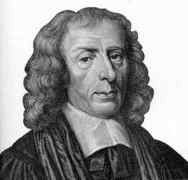Person: More, Henry

Henry More was an English philosopher of science whose ideas may have influenced Newton.
Mathematical Profile (Excerpt):
- After attending Grantham Free School (the Grammar School), More was sent to Eton when he was fourteen years old.
- More came to the belief, which he held strongly throughout his life, that salvation was possible though goodness.
- Flogging certainly did nothing to return More to Calvinism, perhaps it had just the opposite effect.
- In 1631 More entered Christ's College Cambridge.
- More graduated with a B.A. in 1636 and remained at Cambridge to continue his studies being elected a Fellow of Christ's College in 1639.
- Perhaps we should move towards the reason why More is included in an archive of mathematicians.
- More argued that Descartes' ideas must inevitably remove God from nature and so lead to atheism.
- During 1648 and 1649 More and Descartes corresponded about the mechanical philosophy and this correspondence was eventually published as The Immortality of the Soule (1659).
- More argued that the motion of a body was an inherent property of that body, and that it was impossible for motion to be transferred from one body to another.
- More does not deny this fact which any simple experiment will verify, but he claimed that the motion of the second ball is from an internal property of its own, awakened by the impact of the first ball.
- More published Antidote Against Atheisme in 1652.
- In all his arguments one would have to say that either More had not read the works of Galileo and Pascal, or that he had failed to understand their arguments.
- Certainly More puts forward arguments against the spring and weight of air which had already been answered by Pascal.
- More did not just use philosophical arguments against Boyle, however.
- More may have been strongly opposed to Boyle's mechanical philosophy, but he was well disposed towards the experimental philosophy of those in the Royal Society.
- On 25 May 1664 Wilkins again proposed More for the fellowship and he was elected (for a second time) at the meeting one week later.
- In 1670 More published Enchridion Metaphysicum.
- This work repeated More's objections to the mechanical philosophy of Boyle and several other members of the Royal Society.
- Of course there were deep problems which related to space and matter, action at a distance and the vacuum which scientists were struggling with at this time and More's views provided motivation to many scientists to clarify their own ideas and improve their arguments.
- One other thing about Henry More which we should discuss is his relation to Newton.
- Therefore when More was a major figure at Cambridge he must have got to know the young pupil Newton.
- We certainly know that there was contact between Newton and More up till the time More was around 70 years of age.
- Did More's ideas of space influence Newton?
- It is impossible to say with any certainty, but we can certainly note that Newton's idea of absolute space and time was crucial to his physics and that this notion of space is closely related to that put forward by More in his arguments against Descartes.
- For Newton gravity was a force which acted through empty space and although he does not appear to have identified space with God as More did, nevertheless the spiritual aspect of space supported Newton's gravitational theories.
- More never sought advancement within Cambridge, refusing to stand for positions such as Master.
Born October 1614, Grantham, Lincolnshire, England. Died 1 September 1687, Cambridge, England.
View full biography at MacTutor
Tags relevant for this person:
Origin England
Thank you to the contributors under CC BY-SA 4.0! 

- Github:
-

- non-Github:
- @J-J-O'Connor
- @E-F-Robertson
References
Adapted from other CC BY-SA 4.0 Sources:
- O’Connor, John J; Robertson, Edmund F: MacTutor History of Mathematics Archive
